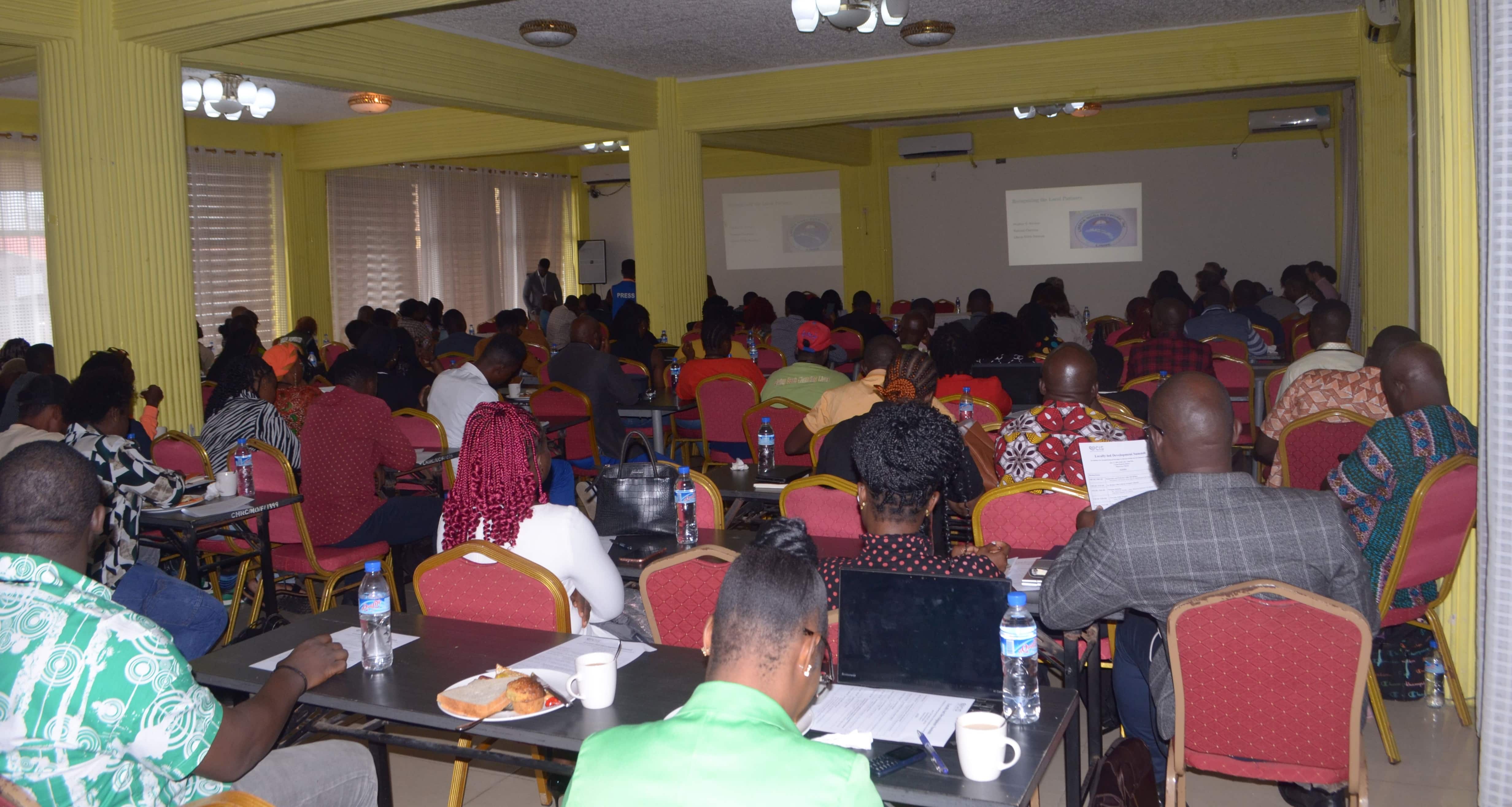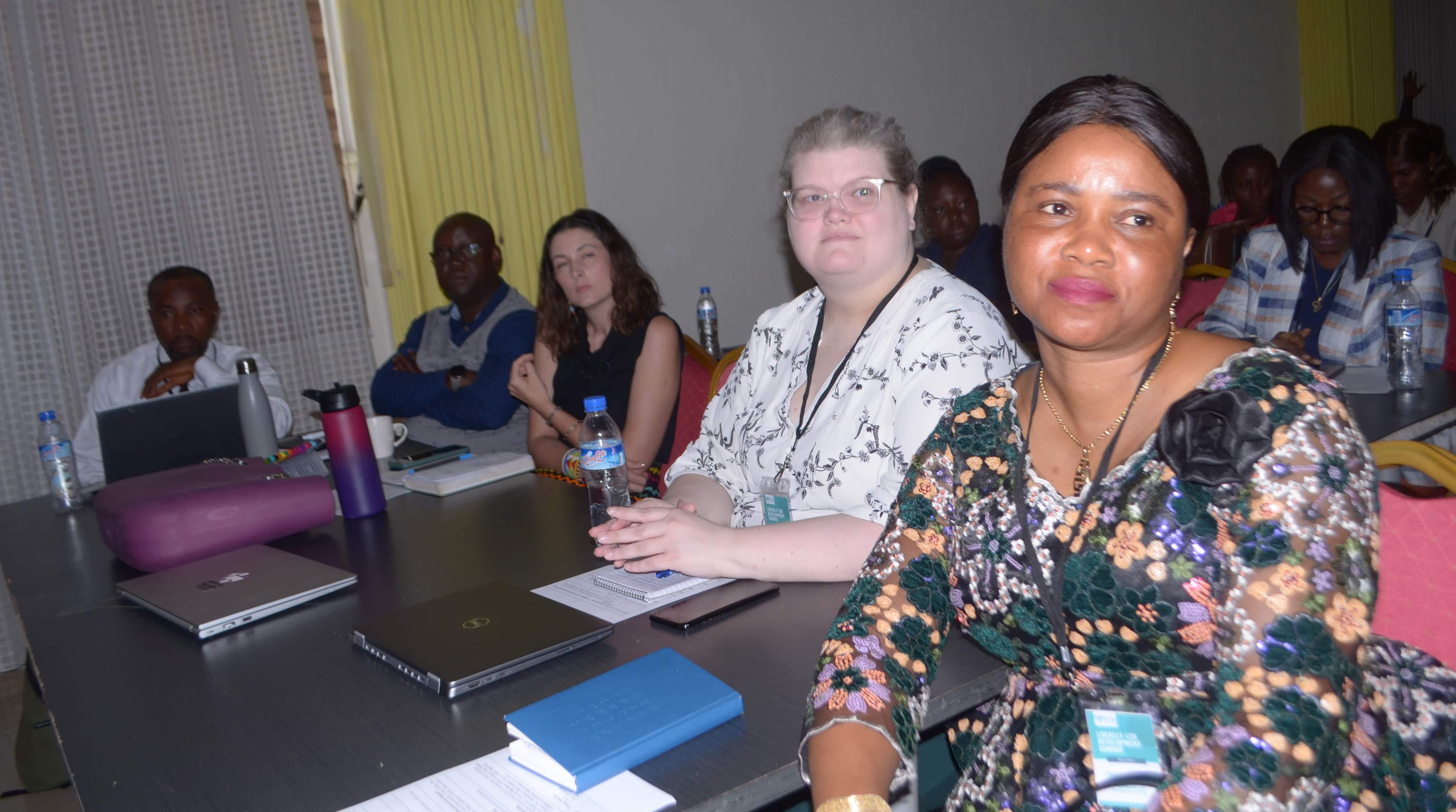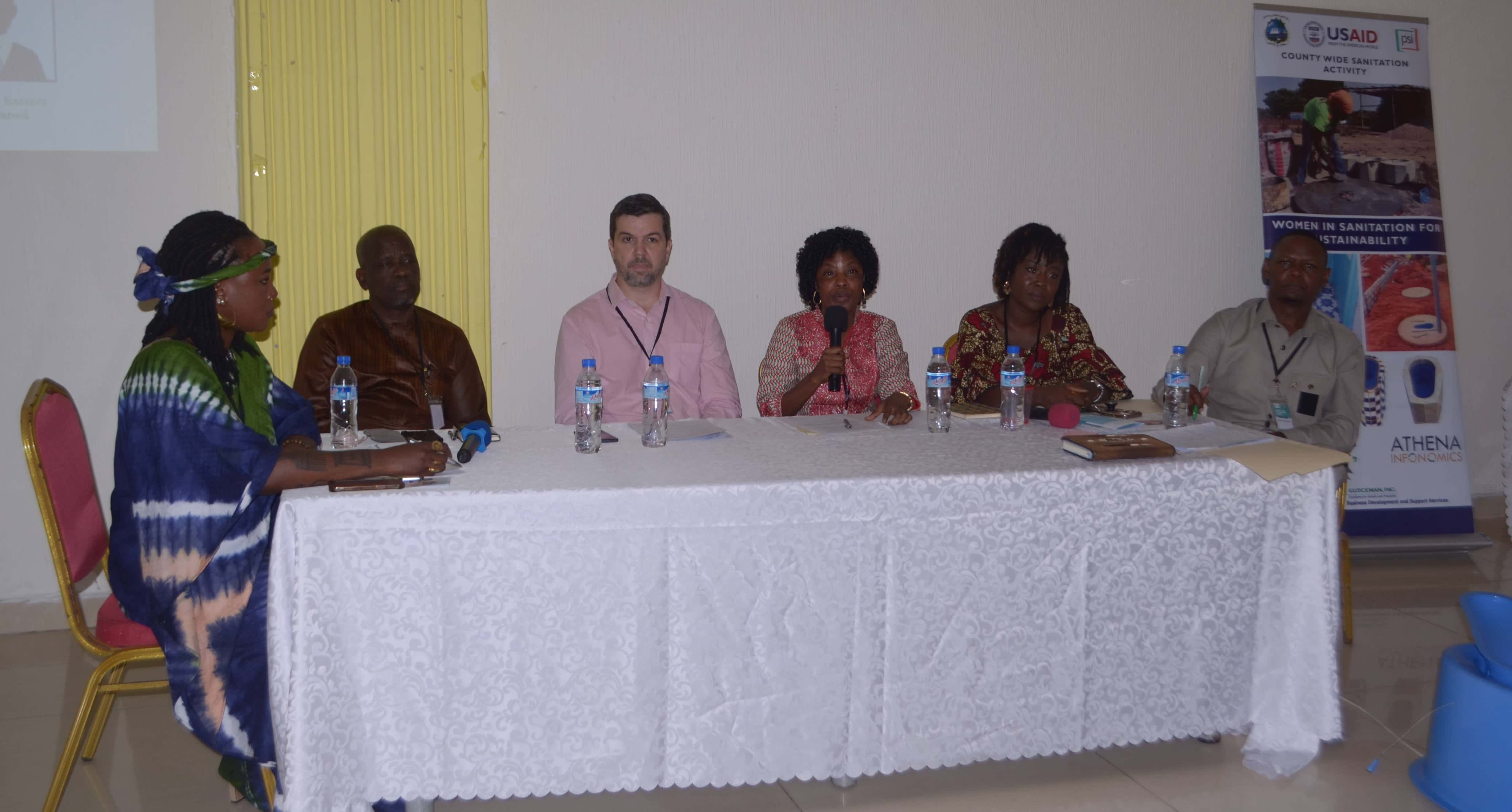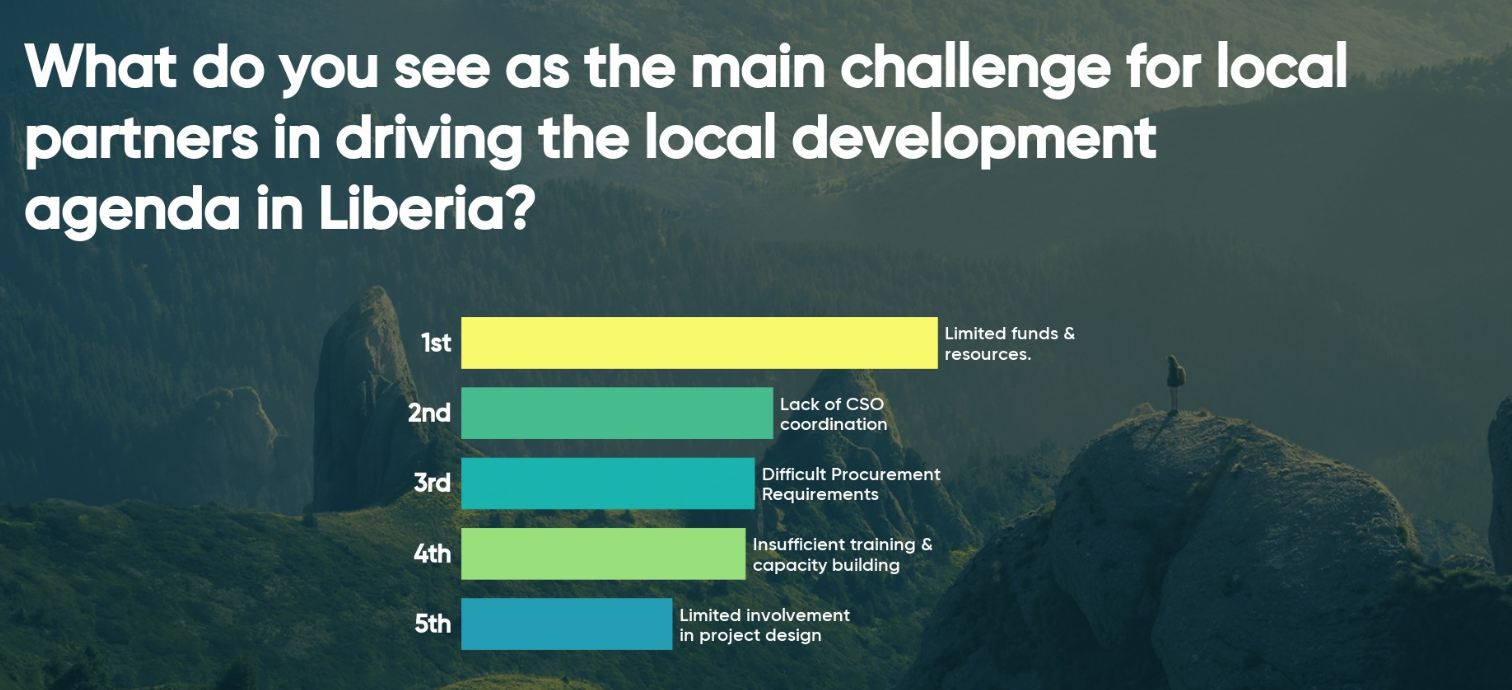Collaboration, Partnership, and Knowledge Sharing shined at the inaugural Locally-led Development Summit in Liberia

Key takeaways and next steps from the Locally-led Development Summit
The need for a more
collaborative effort among stakeholders was answered by the inaugural Locally-led
Development Summit hosted by the Center for Integrated Solutions (CIS). Nearly 200
participants, including the USAID delegation led by the Mission Director,
IrishAid, Unicef,
INGOs, and representatives from over 60 local organizations across Liberia gathered to show
their commitment to driving development efforts in their country. The Summit focused on
enhancing the role of local partners in Liberia’s development agenda by fostering networking
opportunities, sharing best practices, and increasing visibility and engagements with
international donors and implementing partners. At the very beginning of the summit, the
Founder & President of CIS, Varlee A. Sannor, reminded the audience that while this is
not a novel idea, it is something that is vital to Liberia’s development.
We have been working to bring these global conversations into our local spaces
The decision to host the summit came out of the need to address efforts to bring local development initiatives into conversations with global development efforts. Considering that development programs in Liberia are mostly led by international organizations, often leaving local partners without sustainable funding, CIS is dedicated to addressing this challenge. At CIS, we recognize the benefits of deploying tailored approaches to each initiative. We leverage the deep expertise of our in-house technical advisors for program delivery. Our support model is based on continuous learning, adaptation, innovation, and evidence generation. The summit demonstrated our collaborative approach, focusing on customized solutions for Liberia's development challenges. CIS’ Chief Program Officer, Zuleka R. Woods shared that “CIS leaders have been both players and referees in the development sector. We understand the playing field quite well and our job now is to explain the game from all angles to get other local stakeholders engaged." Asmaa Ahmed, CEO of CIS shared that “CIS is demonstrating its commitment to locally-led development efforts by funding and planning this inaugural summit.”
During the summit, we conducted an interactive poll to identify key challenges faced by local organizations and areas where they need the most support. Below are the main issues highlighted and the areas for support:
As part of the summit, both donors and international organizations sat on panels to share various ways their institutions have included local partners in their planning and implementations as well as opportunities for local collaboration. USAID Mission Director, Jim Wright, speaking on the donor panel, highlighted the importance of local leadership for sustainable development, noting that “I remembered as a student in development studies, there were many case studies of failures due to lack of involving locals into solutions. Localization is an important pillar of USAID strategy in Liberia”. The Head of Development at the Embassy of Ireland, Emer Hughes, resounding collaborative efforts shared “It’s good timing to be developing new strategies at the same time as the new government because it allows us to be able to align with that as much as possible.” Also sitting on the donor panel, Ms. Hughes shared that Irish Aid is dedicating a certain amount of resources, time and capacity to building meaningful relationships that inform their actions as donors. UNICEF Deputy Country Representative, Amadou Alassane Cisse reminded the audience that “the key pillar is to collaborate and remain committed to the SDGs. Unicef cannot design a country program without first assessing where you are. Liberians are crucial in our assessment.” Below are the key highlights from the donor panel:
- USAID is developing its new Country Cooperation Development Strategy (CDCS 2026-2030), and its Localization Roadmap for Liberia. USAID will engage with various stakeholders to gather their input.
- Irish Aid has recently rolled out its 5-year Country Engagement Strategy for Liberia. Irish Aid will continue to support three core programmatic areas: Governance, Health/Nutrition, and Gender.
INGOs shared their experiences from working with local organizations in Liberia. Notably, Concern Worldwide has been working with three local organizations in Liberia: Liberia Agency for Community Development (LACD), Serving Humanity for Empowerment and Development (SHED), and Community Empowerment for Change (CEC). Ciara Begley, Country Director, Concern Worldwide emphasized that the huge gap between national and international staff is sometimes driven by this perception that national staff cannot make the jump. She said, “Concern Worldwide is addressing this gap by mandating that Liberians will have the same opportunity as someone from anywhere else in the world and staffing scales will go all the way to the top.” As we continue to reshape Liberia's development landscape, it is crucial to emphasize local leadership and partnerships between local organizations and international development institutions. Echoing these sentiments, Joyce Q. Pajibo, Executive Director, Serving Humanity for Empowerment and Development (SHED) said that “Liberians do not always have to wait for the international partner to donate for our development to move ahead. We have to put our own money, time, and effort into our work to show them we are also serious about development”. SHED has grown over the past 4 years and is now managing grants up to $1.6 million dollars.

The Keynote Speaker, Hon. Dehpue Zuo, Deputy Minister for Economic Management, Ministry of Finance & Development Planning shared that the Public Procurement & Concession Commission (PPCC) is the best mode used for all local businesses going through the bidding process. “We are asking the CSOs to be a part of the development efforts. We are committed and need innovative strategies from right here in this hall”. The MFDP is engaging with CIS to review the Online NGO Registration Portal and develop a comprehensive local partner database that will be used to segment local organizations based on their capacity and experiences.
Here are five key takeaways that emerged from the summit:
- CSO Database for Local Partners: While the MFDP has a platform for the registration and accreditation of organizations in Liberia, the platform needs to be improved with additional data on the presence and operations of local organizations. CIS is currently engaging with the MFDP to create a database of local Partners that highlights their capacity, projects, grants, partnerships, history, contacts, and resources. This database will serve as a primary source for identifying and connecting with CSOs and local firms in Liberia.
- Training and Support: The CSO network expressed deep interest in capacity building opportunities, including training in financial management, project M&E, and proposal writing. CIS is collaborating with the Liberia NGO Network (LINNK) to deliver several training sessions for its members in these identified areas.
- Community of Practice Guide: The recommendation to develop a Community of Practice (CoP) Guide emerged as a pivotal recommendation. This guide is deemed essential for several reasons, including serving as a tool to enhance collaboration by establishing a structured platform for sharing knowledge and best practices. CIS is engaging with relevant CSO networks to solicit their input in the design of the CoP Guide.
- Engagement of Youth-led & Community-based organizations: Engaging with youth and community-based organizations (CBOs) is crucial due to their unique needs, perspectives, and potential impact on development. Youth groups often bring fresh, innovative ideas and are vital for sustaining long-term community development and social change. Similarly, CBOs are deeply rooted in the community's social fabric, possessing intimate knowledge of local needs and dynamics. Such engagement allows for more focused support and capacity-building that respects their deep local insights and promotes grassroots empowerment.
- Partnerships with Liberia Institute of Public Administration (LIPA): CIS is partnering with the Liberia Institute of Public Administration (LIPA) as a crucial step for enhancing the effectiveness of governance and administrative capacities across Liberia’s development sectors. This collaboration with LIPA is expected to facilitate the development of tailored training programs and capacity-building initiatives that align with the specific needs of public administrators and local government officials.

Moving forward, in order to influence the development narrative and build partnerships that reflect Liberia’s needs and potential, we must prioritize local voices and actions. This approach is essential not only for Liberia’s economic development, but also for reshaping international collaborative efforts across Africa. The summit was an assurance that local partners are doing remarkable work in Liberia's development sector, and their efforts need to be amplified. Adama Sarnor, Executive Director of the Liberia Agency for Community Development (LACD), shared: “Somebody has to remind the donors and international partners that Liberians are serious about changes in development. We are not just sitting and waiting”. Indeed we are looking forward to changes with the collaboration of our partners. As the old African adage states “if you want to go fast go alone, if you want to go far, go together.” Together with our international partners and donors, Liberians are ready to go very far.
